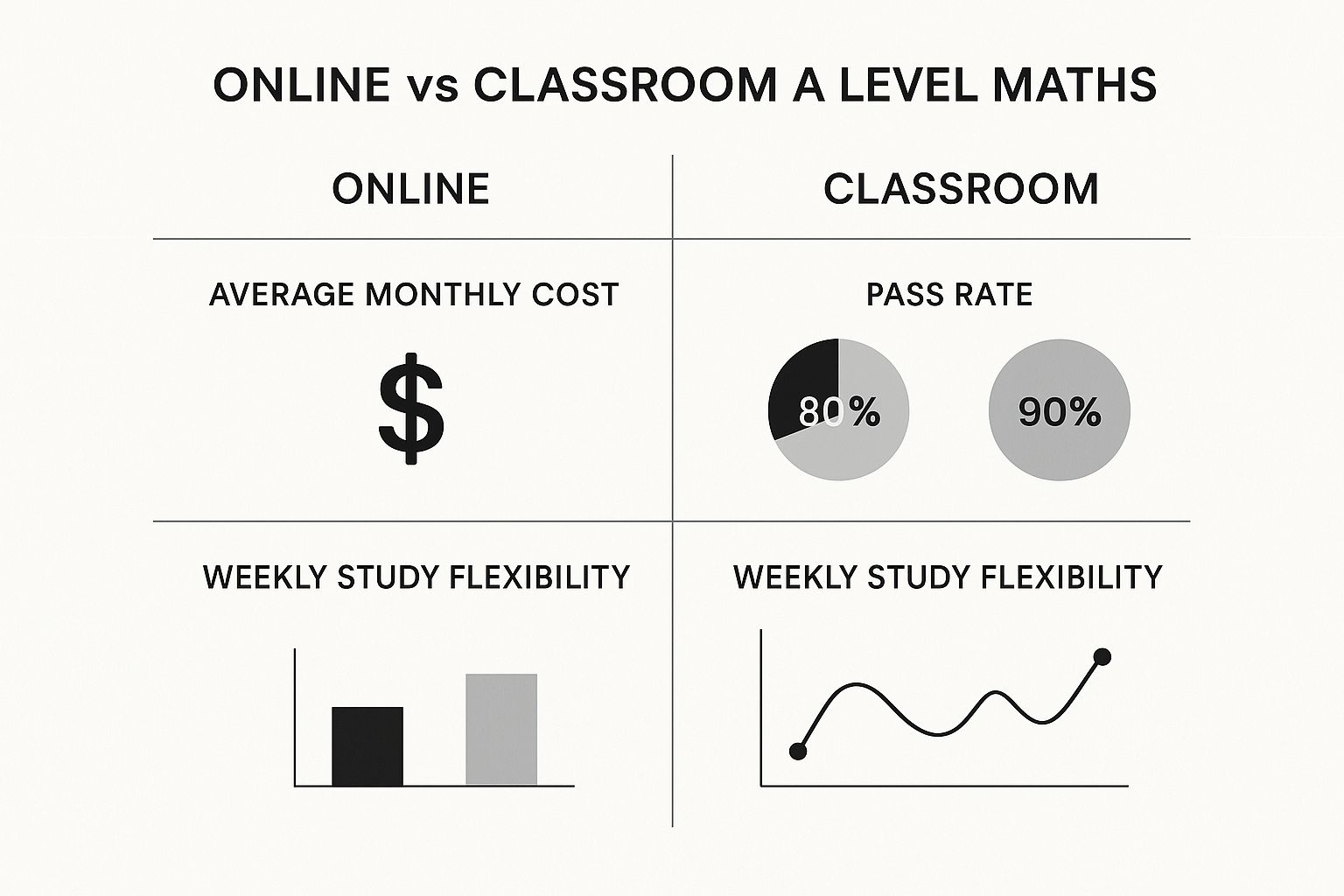Deciding on your child’s educational path can feel overwhelming, especially when you’re looking at something as important as an A Level in Maths online. It’s a decision that has to balance their academic future with their current needs, and the weight of getting it right is huge. This isn’t just about ticking an academic box; it’s about seeing them build genuine confidence and find a real spark of joy in a subject.
Is Online A Level Maths Right for Your Child?
Watching your child navigate their education, you know their unique strengths and the silent struggles they face better than anyone. Sometimes, the rigid, one-size-fits-all structure of a traditional classroom just doesn’t provide the right environment for them to truly flourish. That’s where the world of A Level Maths online offers a powerful alternative, one that wraps itself entirely around your child’s individual needs and pace.
For some students, the reasons are purely practical. Imagine your child is a dedicated young gymnast who needs to fit demanding training schedules around their studies. An online course removes that impossible choice between their passion and their education. It gives them the freedom to learn when they’re most focused, whether that’s first thing in the morning or after an evening session at the gym.
Finding the Best Learning Environment
For others, the benefits are much more personal and emotional. We see so many bright students who feel a knot of anxiety tighten in a bustling classroom. They’re hesitant to ask a question for fear of slowing everyone down or looking foolish. Online learning creates a safe, private space where they can pause, rewind, and re-watch a lesson on a tricky topic like calculus until that wonderful “aha!” moment finally clicks.
For instance, a student struggling with trigonometric identities can replay that specific 10-minute explanation five times if they need to, without any pressure or judgement. This self-paced mastery builds a profound sense of confidence that can be incredibly difficult to foster in a group setting.
The image below breaks down some of the key differences between online and traditional classroom learning, offering a clear visual guide to things like cost, flexibility, and outcomes.

As you can see, online options often provide far greater flexibility with comparable, if not better, results, making them a seriously competitive choice. This growing appeal is reflected in national trends. In 2025, A-level mathematics was still the most popular subject in England with almost 105,000 entries, showing a sustained demand for strong mathematical skills. The right learning environment is key to tapping into that potential.
The goal isn’t just for them to pass an exam; it’s to ignite a genuine understanding and maybe even a love for a subject that opens countless doors. An online environment can be the key that unlocks your child’s potential by putting their learning style, and their feelings, first.
Ultimately, choosing an online A Level in Maths is about finding the environment where your child is seen, supported, and empowered to excel. To understand how this fits into the broader picture, you might find our guide on online A levels in the UK really helpful.
How Online A Level Maths Courses Really Work
Trying to picture a ‘day in the life’ of a student doing A Level Maths online can feel a little fuzzy. You might worry your child will be isolated, just staring at a screen for hours on end. But the reality is far more structured, engaging, and supportive than that. It’s a system designed to build understanding and confidence, one concept at a time.
It’s all about creating a rhythm that works for your child. Instead of a mad dash out the door, their day might begin by calmly logging into a dedicated online portal. Everything is laid out right there: the week’s schedule, lesson materials, and assignments. That immediate sense of organisation helps them feel in control right from the start, reducing that feeling of being overwhelmed.

Building a Strong Foundation
The core of the week usually revolves around pre-recorded video lessons, crafted by subject-specialist tutors. This isn’t just passive screen time; it’s active, supported learning. If a tricky topic like differentiation from first principles isn’t making sense, your child can pause, rewind, and re-watch the explanation until it finally clicks. No holding up the class, no feeling left behind.
You can think of it like building a house for their knowledge:
- The Solid Foundation: The pre-recorded videos lay down the essential knowledge, letting your child get to grips with concepts at their own pace, in their own time.
- The Structural Framework: Live, interactive tutorials are where the real-time connection happens. They jump into small group sessions with expert tutors to ask questions and work through difficult problems together, feeling part of a team.
- The Bricks and Mortar: Homework and assignments, submitted digitally, are the practical application. For example, after a lesson on vectors, an assignment might ask them to solve a real-world problem about flight paths. This is what cements their understanding, building a complete and sturdy knowledge base.
This blended approach means they never feel like they’re going it alone. They get the flexibility of studying on their own terms, but with the direct, human support of live interaction when they need it most.
Personalised Feedback and Growth
Once an assignment is done, it’s submitted through the online portal. And this is where one of the most powerful parts of online learning kicks in: detailed, personalised feedback. Tutors don’t just put a tick or a cross; they leave constructive comments explaining exactly where a mistake was made. For instance, they might write, “Great attempt on question 3, but you forgot to carry the negative sign in the second line of your algebraic expansion. Try it again and see how that changes the answer.”
This feedback loop is absolutely essential. It turns a mistake from a moment of frustration into a powerful learning opportunity, building not just their competence but also their resilience. It tells them, ‘it’s okay to get it wrong, let’s figure out why.’
This method neatly sidesteps a common classroom problem, where a student might not fully grasp their errors before the teacher has to move on. Here, they get targeted advice that speaks directly to their specific challenges, helping them improve continuously. As you weigh up if this model is right for your child, it’s also interesting to see how it fits into wider trends, like how AI is enhancing education in other settings. It all points to a more personalised future for learning, and a good online A Level Maths course is a brilliant way to get there.
The Real Advantages of Studying Maths Online
Beyond the obvious convenience, choosing to study A Level Maths online can genuinely enrich your child’s learning journey and personal development. It’s about creating an environment that adapts to your child, not forcing your child to adapt to it. This simple shift creates powerful advantages that go far beyond just the final exam grade.
Think about a typical classroom. The teacher explains a tricky concept, but before your child has fully processed it, the lesson moves on. A knot of anxiety tightens in their chest. An online setting completely dissolves this pressure. Here, your child has the freedom to pause a video on complex numbers, rewind the explanation of polar coordinates, and work through a practice problem until they get that “aha!” moment of true understanding.

This ability to learn at their own pace builds a deep, genuine confidence that’s often hard to foster in a traditional setting. It’s not just about getting the right answer; it’s about the quiet pride they feel knowing why it’s the right answer.
Developing Skills For Life
This independent learning model also cultivates essential life skills that universities and future employers prize. When your child is responsible for managing their own study schedule, they aren’t just learning mathematics. They’re learning discipline, time management, and how to solve problems on their own initiative.
I once worked with a talented young musician who was preparing for her grade 8 violin exam while studying A-Levels. An online course was the only way she could dedicate hours to practice without her maths grades suffering. By creating a schedule that worked for her, she ultimately achieved a distinction in her music and an A* in maths—demonstrating a level of maturity and commitment that really stands out. To get a broader perspective, you might find this article on the 8 Incredible Benefits of eLearning insightful.
Access To Unrivalled Expertise
One of the most significant benefits is gaining access to world-class tutors, no matter where you live. Your local school might not have a specialist with deep expertise in Further Maths, but online, your child can learn from the very best. This can be the difference between them simply studying a subject and developing a real, lasting passion for it.
The rising popularity of maths is clear. Between summer 2023 and 2024, Further Mathematics saw the highest proportional increase in A-level entries at 9.6%. You can see more of these trends and what they mean for students in this detailed government report.
An inspiring, expert tutor can ignite a student’s curiosity, transforming complex topics from daunting challenges into exciting puzzles to be solved. This access to talent is a game-changer for ambitious learners who deserve to be stretched and inspired.
By putting your child’s needs first, an online course offers a flexible, supportive, and empowering path to success. Exploring the best online learning platforms can give you a clearer picture of how these environments are built to help students flourish.
Choosing the Best Online A Level Maths Provider
With so many options out there for A Level Maths online, picking the right one can feel like a huge weight on your shoulders. You’re not just buying a course; you’re investing in your child’s future, and you need to feel confident they’ll be in safe, caring hands. The decision has to start and end with your child at the centre—their unique learning style, their confidence levels, and what they specifically need to feel supported and succeed.
Making a smart choice means looking past the glossy brochures and asking the tough questions. It’s about digging into the human element behind the screen. Who is actually teaching your child? Are they just a maths expert, or are they also a skilled online educator who knows how to make complex topics feel clear, accessible, and even exciting?
A great provider offers so much more than pre-recorded videos and a stack of worksheets. They create a supportive learning environment where your child feels seen, heard, and valued, even when they’re miles away.
Essential Questions to Ask Providers
Imagine your child hits a roadblock with a tough concept like integration. Feeling stuck and alone can absolutely crush their motivation and self-belief. That’s why your very first question should be about support. “If my child is struggling at 8 pm with a homework problem, what happens? Is there a real person they can reach out to?” What’s the typical turnaround time for getting a question answered?
Next, get into the nitty-gritty of their assessment process. How do they handle mock exams? More importantly, what does the feedback actually look like? Vague comments like “good effort” are useless. You need a provider who offers detailed, constructive feedback that shows a student exactly where they went wrong and gives them a clear path to improve.
The quality of a course isn’t just in the teaching; it’s in the support structure that catches a student when they stumble. A child who feels supported is a child who is free to take on challenges without the crippling fear of failure.
Finally, accreditation is completely non-negotiable. Make sure any provider you consider is approved by official UK exam bodies like AQA, Edexcel, or OCR. This is your guarantee that the qualification is properly recognised and respected by universities everywhere. To get the full picture of how these qualifications fit together, our overview of A Levels online in the UK provides some essential context.
Comparing Key Features
To help you really compare your options, think about the practical, day-to-day details of the learning experience. A provider might have amazing tutors, but if the class sizes are too big, your child could easily get lost in the crowd and feel invisible.
Here is a quick checklist to guide your evaluation and help you get the answers you need for your child.
Provider Comparison Checklist
| Feature to Check | What to Look For | Why It Matters for Your Child |
|---|---|---|
| Live Lesson Frequency | How many live, interactive lessons are held each week? Look for consistent, timetabled sessions. | This is their chance to feel connected, ask questions in the moment, and interact directly with their teacher and friends, just like in a real classroom. |
| Typical Class Sizes | Ask for the average student-to-tutor ratio in live sessions. The smaller, the better. | Smaller groups mean more personalised attention and a greater chance for your child to participate and feel heard, not just observed from the sidelines. |
| Tutor Qualifications | Are the teachers qualified subject specialists with experience in online teaching? | A maths degree is one thing; being able to teach it with empathy and clarity online is another. You want an expert educator, not just an expert. |
| Pastoral Support | Does the provider offer support beyond academics? Look for systems that check in on student well-being, motivation, and progress. | A-Levels are tough. Strong pastoral care ensures your child has a support system to navigate the stress and stay on track, both academically and emotionally. |
| Feedback Quality | Ask to see examples of feedback on marked work. Is it detailed, personalised, and actionable? | Good feedback is a roadmap for improvement. It should tell your child not just what they got wrong, but why and how to fix it for next time. |
Choosing the best online A Level Maths provider really comes down to finding a genuine partner in your child’s education—one that shares your commitment to their success and well-being.
The Right Habits Make All the Difference in Online Maths
Here’s the thing about succeeding in an A-level maths online course: it’s not about being a natural-born genius. It’s about building smart, consistent habits. The freedom that comes with online learning is a massive plus, but it also means your child is firmly in the driver’s seat. Helping them establish the right routines from day one is probably the single most important thing you can do to support them and ease their anxieties.
This isn’t about imposing some rigid, military-style schedule that just adds more stress. It’s about working with them to create a predictable rhythm that makes studying feel like a normal, manageable part of the week. Something as simple as a weekly planner, with dedicated time blocks for maths, can empower your child and dial down that last-minute panic when deadlines start to loom.

Creating the Right Environment
The physical space where your child learns makes a huge difference to their focus and emotional state. A dedicated, quiet study zone—even if it’s just a specific corner of a room—sends a clear signal to the brain that it’s time to concentrate. Make sure it’s as free as possible from the usual distractions like phones, the telly, and general family chatter, giving them a calm sanctuary to learn in.
When it’s time to tackle the really tough topics, like mechanics or statistics, focus techniques can be a lifesaver. The ‘Pomodoro Method’ is a brilliant, gentle tool for this. It works like this:
- Set a Timer: Your child picks one specific task (e.g., “practice 3 integration problems”) and sets a timer for 25 minutes.
- Work Without Distractions: They focus only on that task until the timer rings. No phone, no social media.
- Take a Short Break: They get up, stretch, and have a 5-minute break away from the screen.
- Repeat the Cycle: After four ‘Pomodoros’, they take a longer, well-deserved break of 15-30 minutes.
This method breaks down what feels like a mountain of revision into small, manageable climbs. It prevents that awful feeling of burnout and keeps concentration sharp.
Shifting from Passive Watching to Active Learning
One of the biggest traps in any online course is passively watching video lessons without the information ever really sinking in. It feels like learning, but it isn’t. To get around this, you have to encourage active learning. Instead of just listening, your child should be taking notes, pausing the video to try problems themselves, and jotting down any questions that pop into their head.
The goal isn’t just to consume the material; it’s to wrestle with it. A student who actively questions, challenges, and applies what they’re learning is building a much deeper, more permanent understanding. They are owning their education.
This proactive mindset needs to carry over into asking for help. Struggling in silence is the fastest route to falling behind and feeling hopeless. Make sure your child sees the online forums and scheduled tutor ‘office hours’ as their first port of call. Posting a quick question on a forum or booking a chat with a tutor can solve a problem in minutes—a problem that could otherwise cause days of frustration and self-doubt.
There’s no doubt that mastering A-Level Maths is a serious undertaking, and it’s a key stepping stone for a reason. In 2024, maths was the most popular subject by entries in England, with a huge 107,427 students taking the course. You can explore more about these national academic trends and see just how many students are on this same path. This popularity just goes to show how vital it is to build effective study habits to really stand out.
Your Questions About Online A Level Maths Answered
As a parent, you’re naturally going to have questions when looking into something as important as your child’s A-Level education. It’s completely normal to feel a mix of excitement and a little apprehension when considering a path like A Level Maths online. You want to be sure you aren’t just choosing a course, but the right support system to help your child feel happy and successful.
Let’s tackle some of the most common worries we hear from parents. Choosing an online school can feel like a big step, but it’s a path that is becoming increasingly well-trodden and respected. Your concerns are likely practical ones, centred around making sure your child’s hard work pays off and that they don’t feel lost or alone on their journey.
How Are Final Exams Taken?
This is often the first question on every parent’s mind. “If they’re not in a school building, how do they sit the official exam?” The process is actually very straightforward and well-established. Your child will sit their exams as a private candidate at a local, approved exam centre.
A good online school will hold your hand through this every step of the way. They’ll help you find a convenient centre and make sure all the registration paperwork is handled correctly and without stress. This means the final A-Level certificate they receive—awarded by the same official exam boards like AQA or Edexcel—is identical to one earned in a traditional school. Their achievement is formally and fully recognised, with no distinction whatsoever.
Do Universities Value an Online A Level Equally?
The short answer is: yes, absolutely. Universities really only care about two things: the accreditation of the qualification and the grade your child achieves. As long as the course is delivered by an accredited provider and leads to an official qualification, it holds the exact same weight as an A-Level from any bricks-and-mortar school.
The mode of study is irrelevant to admissions tutors; what matters is your child’s demonstrated knowledge and the official grade they were awarded. An A* in Maths is an A* in Maths, whether it was earned online or in a classroom.
Rest assured, you are not compromising their future opportunities in any way. In fact, you are giving them an environment where they are more likely to achieve their best grade.
What If We Run Into Technical Problems?
The fear of a frozen screen during a crucial lesson is completely understandable. It’s a horrible thought. However, any established online school has robust technical support systems in place for this very reason. There’s usually a dedicated, friendly support team on standby to quickly troubleshoot any issues, from login problems to software glitches.
This ensures that any disruption to your child’s learning is minimal and resolved quickly, so they can get back to focusing on their studies without any added stress or panic.
How Will My Child Socialise?
Worries about isolation are natural, as we all know school is about more than just academics. It’s about friendship and connection. The best online providers actively build a strong sense of community. Students connect with their classmates in live lessons, collaborate on group projects in breakout rooms, and interact on supervised forums where they can discuss problems and help each other out.
This creates a brilliant network of like-minded learners from all over the country—and sometimes, even the world. It shows them they are not alone. To build on this, you can also encourage your child to:
- Join local clubs or sports teams that match their interests.
- Arrange in-person study groups with other online learners who live nearby.
- Get involved in community volunteering opportunities.
This balanced approach helps them develop vital social skills while still benefiting from the focused, distraction-free academic environment that online learning provides, giving them the best of both worlds.
At Queens Online School, we understand these questions because many of us are parents too. We provide a fully accredited and supportive environment designed to help your child thrive. To learn more about how our live, interactive classes and dedicated tutors can support your child’s A-Level Maths journey, visit us at https://queensonlineschool.com/.

